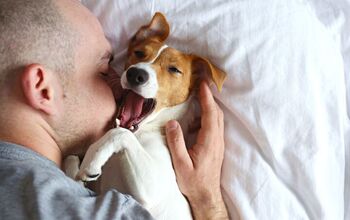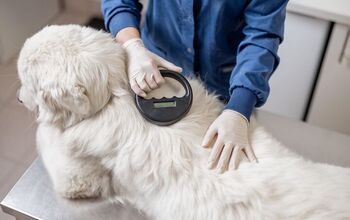Head Pressing in Dogs: Should You Be Concerned?

Dogs are known for doing some pretty strange things and, for the most part, their odd behaviors are harmless. As a dog owner, however, it is your job to know when a change in behavior is nothing to worry about and when it could be an indication that something is wrong. Head pressing is one of those behaviors that should not be ignored because it could be a sign of something serious. Keep reading to learn more about head pressing in dogs and what it means.
Related: What is Syringomyelia in Dogs?
What is Head Pressing in Dogs?
A change in behavior is often the first indication of illness in dogs, though the behavior itself may not always make it obvious what the underlying problem is. Signs of weakness, low energy, or loss of appetite are common symptoms but one that is less common but still serious is head pressing. Head pressing is when your dog stands near a wall or in a corner, hanging his head low and not moving. He doesn’t actually have to press his head against the wall for it to count as head pressing.
Head pressing is typically a sign that something isn’t right with your dog’s nervous system. It could be an indication that a previously existing condition has progressed to include neurological involvement, or it could be a sign of a nervous system-specific ailment. Head pressing behavior won’t go away on its own and it is usually an indication that something is wrong which requires treatment. Contact your veterinarian right away to determine the cause of the problem and the solution.
Related: What is Megaesophagus in Dogs?
What Are the Causes of Head Pressing?
In addition to pressing his head against the wall, related symptoms may include reduced reflexes, compulsive pacing, seizures, visual problems, and other changes in behavior. Here are some of the potential causes for head pressing in dogs:
- Neurological disorder
- Canine distemper virus
- Metabolic disorders
- Brain tumor
- Cancer of the nervous system
- Infections of the nervous system
- Myelitis or meningitis
- Poisoning or toxicity
- Trauma
- Degenerative disease
To diagnose your dog’s problem, your vet will need a detailed history of his symptoms including any other changes in behavior. Be sure to tell your vet about any recent changes in medication, injuries, or visits to a kennel. You should also let your vet know if you suspect that your dog has ingested something which could be causing the problem.
How Should You Handle It?
The only treatment for head pressing is to resolve the underlying cause of the behavior. If poisoning is the cause, your vet will try to identify the offending toxin and offer a treatment to counter it. Neurological causes for head pressing may require additional testing to identify the specific disease, after which your vet can recommend a treatment. Your dog’s prognosis and recovery will depend on the underlying cause for his head pressing as well as the treatment.
If you notice head pressing behavior in your dog, don’t hesitate to contact your veterinarian. This seemingly simple behavior is often a sign of a serious problem, so don’t ignore it!

Kate Barrington is the loving owner of two cats (Bagel and Munchkin) and a noisy herd of guinea pigs. Having grown up with golden retrievers, Kate has a great deal of experience with dogs but labels herself a lover of all pets. Having received a Bachelor's degree in English, Kate has combined her love for pets and her passion for writing to create her own freelance writing business, specializing in the pet niche.
More by Kate Barrington























